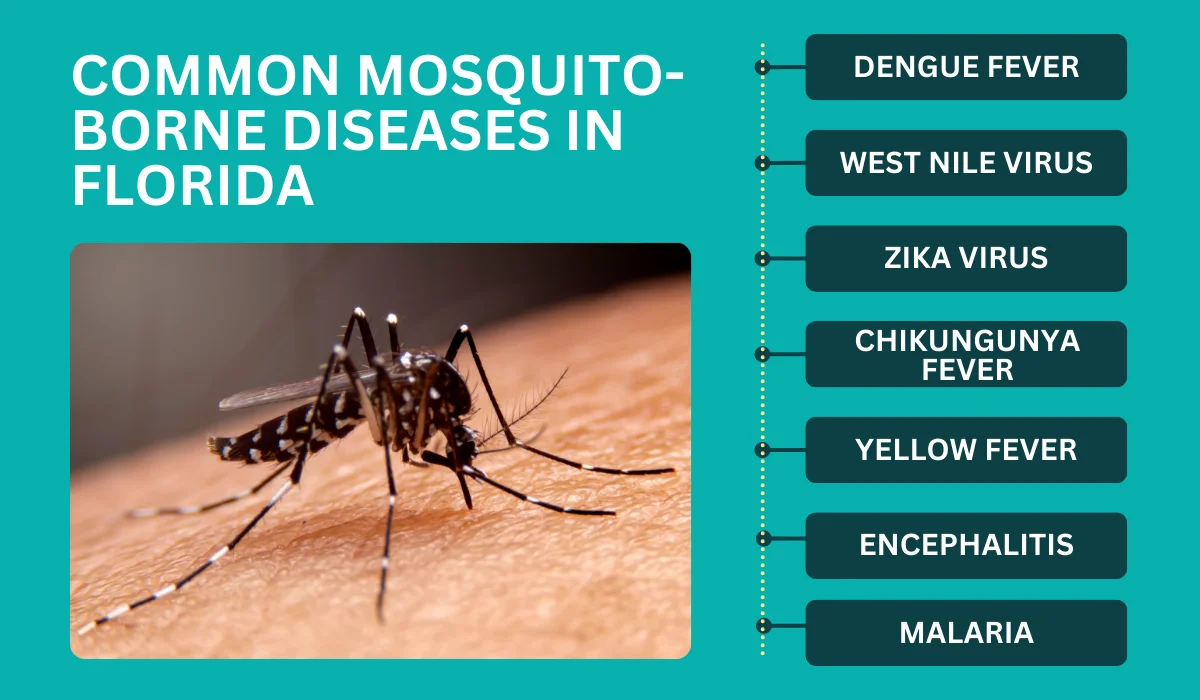What Diseases Do Mosquitoes in Florida Carry?
Living in Florida comes with its challenges, especially the ever-present mosquitoes. These pests are more than annoying—they carry mosquito-borne illnesses like West Nile Virus, Dengue fever, and Zika virus.
Especially during the rainy months, mosquitoes are rampant, posing a significant health threat and increasing the risk of these illnesses spreading.
Are you aware of how these diseases might affect you? Keep reading to learn how to protect yourself and your loved ones from the dangers of Florida's mosquitoes.
Key Takeaways
- Florida's warm climate promotes the spread of mosquito-borne diseases like Dengue Fever, Zika Virus, and West Nile Virus, which can cause severe symptoms.
- Comprehensive mosquito control strategies, including personal protective measures and community prevention efforts, are essential to mitigate the risks of mosquito-borne diseases in Florida.
- When routine prevention fails, professional pest control services are vital, providing specialized knowledge and comprehensive solutions for mosquito management in Florida.
Common Mosquito-Borne Diseases in Florida

Many mosquito species thrive in Florida’s warm climate, increasing the risk of several mosquito-borne diseases.
Dengue Fever
The Aedes albopictus and Aedes aegypti mosquitoes typically transmit cases of Dengue Fever in Florida.
The arbovirus can cause severe flu-like symptoms that significantly differ from other mosquito-borne diseases. Some signs and symptoms unique to this illness include:
- Unique bone-breaking fever associated with severe pain
- Rash may appear over most of the body
- Marked decrease in platelets
- Occasional development of dengue hemorrhagic fever, a severe and sometimes fatal form
West Nile Virus
West Nile Virus (WNV) circulates between birds and mosquitoes, with humans being incidental hosts.
Florida experiences sporadic outbreaks, which can lead to severe neurological diseases. Signs or symptoms of a severe case are:
Signs or Symptoms | Description |
Coma | Periods of unconsciousness |
Tremors | Involuntary muscle contractions |
Convulsions | Severe seizures |
Muscle Weakness | Particularly in the extremities |
Vision Loss | Partial or complete loss of vision |
Zika Virus
The Zika Virus, originating in Africa and Asia, has been particularly impactful for pregnant women due to possible congenital disabilities.
Florida saw an uptick in Zika cases with travel-related transmission. Hence, officials have released public health advisories, such as:
- Pregnant women are advised to avoid areas with Zika outbreaks.
- The public is advised to eliminate standing water where mosquitoes breed.
- Emphasis on protection from female mosquito bites through repellents and proper clothing.
- Screening of blood donations to prevent transfusion-related spread.
Chikungunya Fever
Chikungunya is notable for causing debilitating joint pain and has been identified in Florida, causing concern for those who contract it from infected mosquitoes.
For infected individuals, treatment options can include:
Treatment Options | Description |
Pain Relievers | NSAIDs to reduce fever and relieve pain |
Rest | Adequate rest to improve recovery |
Fluids | Prevent dehydration and aid recovery |
Physiotherapy | Alleviate joint pain and restore movement |
Yellow Fever
Historically, Yellow Fever significantly impacted Florida, but modern efforts have reduced the risk substantially.
Vaccinations prevent further outbreaks and create antibodies specific to that virus. To prevent its spread, the Centers for Disease Control and Prevention (CDC) recommends:
Vaccination for American travelers to high-risk countries.
Complete vaccination at least ten days before travel.
Routine infant vaccination in endemic areas.
Encephalitis
Several types of encephalitis, such as Eastern Equine Encephalitis and St. Louis Encephalitis, are caused by mosquito-borne viruses in Florida.
Minor cases of both diseases can present with similar symptoms. However, the distinctions between their symptoms become more apparent in severe cases:
Types | Symptoms of Severe Cases |
Eastern Equine Encephalitis | Disorientation, seizures, and coma that result in significant brain damage or death in many cases. |
St. Louis Encephalitis | Meningitis or encephalitis has symptoms like stiff neck, confusion, and dizziness. |
Malaria
Officials in Florida maintain vigilance regarding malaria, given the historical eradication and potential for re-emergence.
Here are some of the ongoing implementations to mitigate this vector-borne disease:
Ongoing mosquito surveillance to detect early signs of malaria
Public education materials on Anopheles mosquito bite prevention
Mosquito Prevention and Control
Effective mosquito control and prevention are crucial in Florida to reduce the spread of mosquito-borne diseases.
By integrating personal and community approaches, you can minimize the risk of mosquito bites and the diseases they may carry.
Protecting yourself from mosquito bites is the start of preventing mosquito-borne diseases. So, here are ways to protect yourself and how to incorporate them into your daily routines:
Protective Measures | Daily Incorporation for Floridians |
Use of EPA-registered insect repellents (e.g., DEET) | Apply mosquito repellent when spending time outdoors during peak mosquito activity times. |
Wearing long pants and long-sleeve shirts | Choose light-colored and loose-fitting clothing when outside. |
Installing screens on windows and doors | Ensure living spaces are protected to keep mosquitoes away. |
Emptying water from containers (e.g., gutters) | Check and clear places where water collects at least once a week. |
Is It Time to Call the Experts?
If mosquitoes persist despite routine prevention efforts, such as removing standing water and repellents, this might indicate a more significant problem requiring professional pest control attention.
Professional pest control companies (like us, here at Native Pest Management) have access and expertise to know the ins and outs of mosquitoes in Florida.
We also offer comprehensive services that include inspection, treatment, and follow-up.
